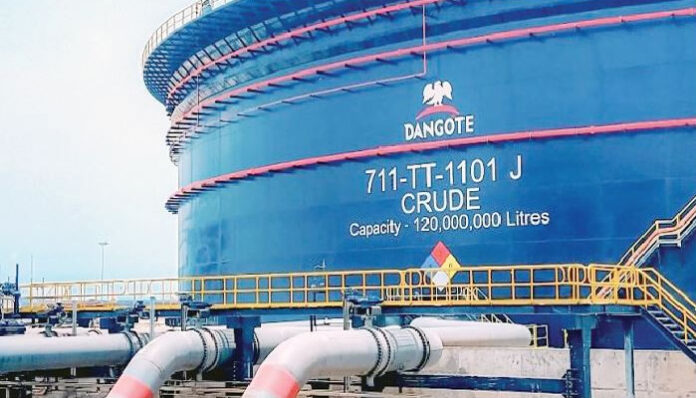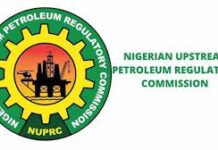– Crude oil production rises to 1.48mpd
The ongoing competition between fuel importers and the Dangote Petroleum Refinery has resulted in a reduction in the ex-gantry price of Premium Motor Spirit, also known as petrol, to N825 per litre by the $20bn Lekki-based refinery.
The new amount is a N10 decrease from the N835 per litre that was publicly announced by the refinery last month.
This came as data from the Nigerian Upstream Petroleum Regulatory Commission on Monday indicated that Nigeria’s daily average crude oil production rose to 1.485 million barrels per day in April. It was 1.40mbpd in March.
Marketers confirmed on Monday that the refinery has effectively reduced its petrol price to N825 per litre, offering customers a N10 rebate upon successful loading and evacuation of products from its facility.
They revealed that although the refinery officially prices its product at N835 per litre, it effectively reduces the cost through a post-evacuation rebate granted to customers after loading and evacuation, a strategic move aimed at undercutting competitors and retaining market share.
This tactical move is widely seen as part of an intensifying pricing battle to maintain market share in the increasingly competitive downstream petroleum sector.
The covert price adjustment has allowed its customers and marketers to retail the product at a lower band of N830 to N835, outpricing importing marketers and private depot owners.
Marketers say the price war further exposed the frailties of Nigeria’s deregulated petrol market amid forex instability and distribution bottlenecks.
They suggested that the reduction could lead to lower pump prices and benefit most consumers who rely on fuel for their economic activities. They also argued that energy costs, which impact food prices, could lessen, leading to a drop in the prices of goods.
Confirming the development, the National Publicity Secretary of the Independent Petroleum Marketers Association of Nigeria, Chinedu Ukadike, stated that the latest drop in fuel prices was primarily driven by intense market competition, particularly between the Dangote refinery and fuel importers, who now aggressively slash prices to maintain market share.
Ukadike, speaking in an interview, said, “Yes, the latest price reduction was largely caused by competition between Dangote and importing marketers who are also reducing their prices. That is the beauty of deregulation. It’s true, the refinery is now selling at N825.
“You know that recently, we had a discussion about whether IPMAN would back the government to stop importation, and I refuted it and said that importation will be a stimulant and stabilising factor in driving prices down.
“Whatever Dangote is doing to its customers is also a welcome development because it shows that there is competition and once prices are at par, all retailers and depot owners will try to use any means of marketing to be able to ensure that they get their customers to buy and evacuate their products because product evacuated is profit gained and stagnant product at the depot is stagnant capital. We laud Dangote and charge others to follow suit.
“Anything that has to do with the standard practice of petroleum products as stipulated in the international market is accepted. Once there is a fall in the dollar and crude oil, it must be reflected in prices, which is the actual sense of the deregulation.”
Ukadike also predicted a further drop in petrol price. “Yes, I agree that Dangote price should be lower than what it is, but since we don’t have details of the refinery cost of production, there is nothing to be done.”
Two marketers who spoke on condition of anonymity said the Dangote refinery has quietly slashed its prices in a strategic move to keep dominating the domestic fuel market.
“Dangote has reviewed its price downward to edge out importers and private depot owners,” one of the marketers revealed.
“Since the last price cut to N835, and with the massive market share it has already captured, over 50 per cent, those still importing are scrambling to hold on to the remaining share. So, every time Dangote drops its price, depot owners are forced to follow suit.”
The marketer noted a significant shift in market dynamics, saying, “Local competition is now driving pump prices, not global crude oil benchmarks. The Dangote refinery has started giving a rebate on its products. It’s not an official reduction yet, but paid back after marketers buy products from them.”
Another marketer confirmed that the refinery has further adjusted its bulk price, but is doing so through indirect discounts rather than openly publishing the new rates.
“Dangote is tactically offering discounts to bulk buyers, allowing some marketers to lift at around N825. That’s why products are now selling at depots between N827 and N830,” the source said.
“It’s a strategic pricing move. Private depot owners, despite suffering losses, have also been forced to lower their prices to stay competitive. Importers are expected to follow suit with another review.”
Checks by our correspondent using petroleumprice.ng showed that the Dangote refinery depot has dropped its price by N12 to N827 per litre on Monday from N839 it sold its product last week Monday.
Similarly, MRS Tincan depot, a major partner with the refinery, is now selling at N827 per litre, from N838 it listed its products last week. Pinnacle is selling at N827 from N839, it listed its products last week, indicating these depots are now sourcing their product at a much lower price.
When compared, petrol-importing marketers such as Rain Oil Depot, A.A Rano, A.Y.M Shafa and NIPCO Lagos are currently selling at N870, N837, N870 and N842 per litre respectively. This is between N12 and N43, higher than the price offered by Dangote.
An oil and gas expert, Olatide Jeremiah, said the price reduction is a tactical move by the refinery to edge out competitors and remain as the dominating force in the downstream sector.
He said, “Today’s price reduction, called a rebate by Dangote, is a tactical move to edge off competitors. The price war is intensified, and every bloc wants to keep a larger market share. I can categorically tell you that the crude oil price surge won’t influence prices that much, as the local market reality will supersede it.
“Dangote refinery have successfully captured the Nigerian Petroleum market, I am certain importers and private depot owners will do everything to remain in business. It’s an interesting time, no more abnormal profits.
Efforts to get an official reaction from Dangote spokesperson, Anthony Chiejina, on the price reduction were futile as he didn’t respond to several calls and messages sent to his phone number.
Crude production
Nigeria’s daily average crude oil production rose to 1.485 million barrels per day in April, according to a report by the Nigerian Upstream Petroleum Regulatory Commission on Monday.
The April output was about 85,000 barrels per day above March’s 1.40mbpd, showing significant improvement in the government’s efforts to ramp up oil production.
However, this is still below the quota approved for Nigeria by the Organisation of the Petroleum Exporting Countries, which is 1.5mbpd.
In its remarks on the April production, the NUPRC said the lowest and peak combined crude oil and condensate production in April were 1.60mbpd and 1.73mbpd, respectively. The average crude oil production was 99 per cent of the OPEC quota (1.5 mbpd)
“The daily average production in April was 1,683,307 barrels per day, comprising both Crude oil (1,485,700 bopd) and condensate (197,607 bopd),” the NUPRC said.
The PUNCH reports that in January, crude production grew slightly above the 1.5mbpd quota allotted to Nigeria by the Organisation of the Petroleum Exporting Countries.
The January output gave hope to industry players that the country was serious about realising its ambitious 2mbpd target in 2025.
However, in February, the feat achieved in the first month of the year was eroded as production declined again, and this repeated itself in March, casting doubts on the feasibility of ramping up production to 2 mbpd this year.
The April output appears to be a positive signal as the Federal Government struggles to achieve its ambitious 2 mbpd.

























